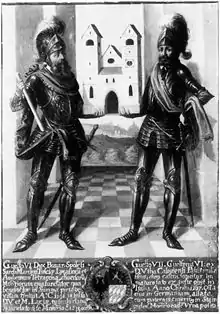Welf VII
Welf VII (c. 1135 – 11 or 12 September 1167) was the only son of Welf VI, Duke of Spoleto and Margrave of Tuscany, and Uta, daughter of Godfrey of Calw, count palatine of the Rhine. He was a member of the House of Welf.

His father inherited the family's estates in Swabia, including the prominent counties of Altdorf and Ravensburg, which he gave to Welf. Welf, however, spent much of his time managing the Italian possessions while his father stayed in Swabia. Both Welfs supported Frederick Barbarossa as king of Germany and the younger Welf (VII) accompanied him on his Italian campaigns, starting in 1154. In 1160, he was made duke of Spoleto by the emperor. Between 1164 and 1166, he participated in the famous feud between his father and Hugh of Tübingen, which the emperor himself resolved. He was a participant in the campaign of 1167, in which malaria devastated the army and forced the emperor back over the Alps. Welf was a victim of the malaria and died at Siena. He was buried in Steingaden Abbey in Bavaria, where his father was also later buried.
| Italian nobility | ||
|---|---|---|
| Preceded by Welf VI |
Margrave of Tuscany 1160–1167 |
Succeeded by Welf VI |
| Duke of Spoleto 1160–1167 | ||